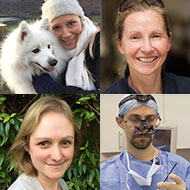
Experts will encourage debate around animal welfare issues
Veterinary charity Animal Welfare Foundation has appointed four of the UK’s leading veterinary surgeons and animal welfare scientists to its board of trustees.
Joining nine other experts on the board are zoo animal and wildlife specialists, Romain Pizzi and Justine Shotton; equine vet Deidre Carson; and biologist Charlotte Burn. Trustees play a key role in ensuring that AWF continues to improve on animal welfare by supporting veterinary education, funding research and encouraging debate animal welfare issues.
Welcoming the new trustees, AWF Chair of Trustees Chris Laurence said: “I am delighted to welcome Romain, Justine, Deidre and Charlotte to the AWF board. They bring with them an enormous range of knowledge, skills and expertise, which will be critical to helping us advance our mission and continue to fund quality research, support veterinary education and encourage debate on animal welfare issues.”
Former British Equine Veterinary Association president Deidre Carson commented: “I am passionate about animal welfare, conservation and biodiversity and believe that vets should be leading the way in improving the way animals and our environment are managed. I am looking forward to working with other enthusiastic and knowledgeable people to progress the work of AWF and to see the results of those efforts.”
Dr Shotton, veterinary services manager at Marwell Zoo, said: “I believe that AWF can make a real and positive difference to the lives of millions of animals, and I want to be a part of that. I’m looking forward to being able to contribute my skills and experience to help progress our understanding of animals to better improve their welfare. I’m also looking forward to engaging in debate around animal welfare issues in order to identify ways forward with initially complex and challenging issues.”
Image (C) AWF.



 The Animal and Plant Health Agency (APHA) has updated its online reporting service for dead wild birds.
The Animal and Plant Health Agency (APHA) has updated its online reporting service for dead wild birds.